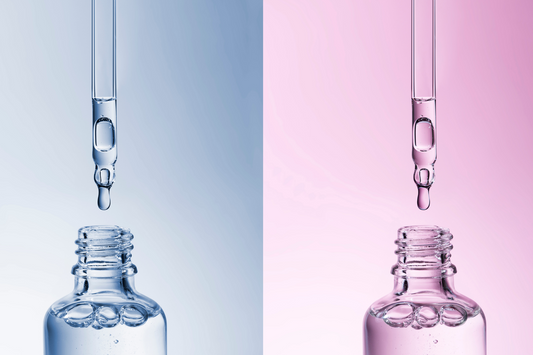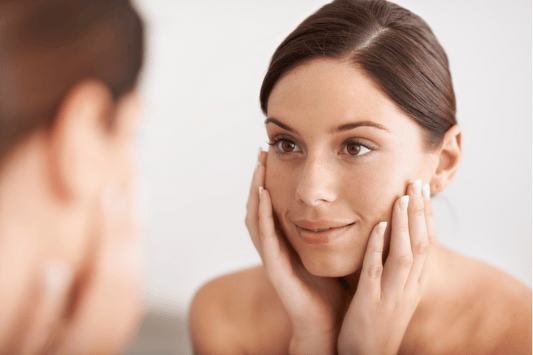We’ve talked about it before in previous blogs, but when it comes to maintaining proper health, vitamins and supplements can be an effective option in your toolkit to make up for dietary imbalances. For hair growth, several vitamins are essential for providing the necessary building blocks for our bodies to strengthen and grow the hair we’re longing for.
What about prenatal vitamins for hair growth? Do they work? Prenatal vitamins are a supplemental blended specifically formulated with vitamins and minerals needed support fetal development and a healthy pregnancy. They've gained traction as being a potential option for stimulating hair growth. Why?
Well, as the reasoning goes, pregnant women are known for developing a radiant, healthy glow during the magical months of their childbirth journey. Since we already know the visible benefits of a healthy, balanced diet on our wellbeing and physical appearance, it would seem plausible that the vitamins and nutrients so important for prenatal development might contribute to that vibrant glow.
As more and more women are looking to combat hair loss and begin a journey of their own to get back the hair of their dreams, many are turning to prenatal vitamins and supplements in an attempt to stimulate hair regrowth. But do prenatal vitamins really work for hair regrowth? After some digging, we found that the conventional wisdom may not paint the full picture.
Why are vitamins important for hair growth?
Before we get into prenatal vitamins for hair growth, let's discuss vitamins and minerals in general. Vitamins and minerals are necessary for a healthy diet and lifestyle and are commonly found in a balance of the foods we already consume on a daily basis. Nowadays, many common ingredients and foodstuffs are supplemented with even more nutrients that years of experience and research have shown to be beneficial: Milk can often be fortified with vitamin D, variations of orange juice may be supplemented with calcium, table salt can contain additional iodine, and more.
Vitamins and minerals are the building blocks for our bodies to do its job effectively. You can think of them like ingredients for a recipe. For healthy hair growth, different recipes might be required depending on a number of factors, which, meaning that our bodies may need to keep a different amount or type of ingredient in stock.
During pregnancy, additional strain is put on the mother in order to make sure she receives not just enough nutrients for herself, but also for her child. Being at an entirely different stage of life, the developing fetus requires additional amounts of vitamins and minerals like folic acid, iron, calcium, and vitamin D.
Many prenatal vitamins contain additional amounts of these nutrients, and they’re formulated to help consumers exceed the recommended daily values typical for healthy adults in order to reach the levels necessary for pregnancy and fetal development.
Drawbacks to excessive prenatal vitamin supplementation
Given that vitamins are often viewed as helpful, benign supplements that can only do good, it’s entirely reasonable that more of a good thing can only be better. Prenatal vitamins must help with hair growth. Right?
As we’ve discussed before, the "dose makes the poison". Some ingredients, like those known as GRAS for Generally Regarded As Safe, have a wide range of tolerable amounts as part of a normal diet or healthcare routine. In excess, however, even water—one of the most fundamental components of living things—can be toxic and disrupt the normal orderly processes going on within our bodies.
Folic acid
Folic acid is a key prenatal vitamin during pregnancy and a form of vitamin B9. It works to direct the development of the neural tube in the fetus during pregnancy. Disruptions at this critical stage can lead to deformities and severe complications, so additional folic acid during the prenatal stage helps to fortify this core process.
In our piece on folic acid, we highlighted that the CDC typically recommends 400 mcg daily folate equivalent (DFE) for healthy adults, rising to 600 mcg DFE for pregnant women. While excess folic acid is released from the body in urine, a higher-than-normal intake of vitamin B9 can mask deficiencies in vitamin B12— another important important vitamin which can have neurological consequences, when lacking.
Iron
Excess amounts of iron, the other crucial ingredient that’s boosted in prenatal vitamins, can cause similar complications. Iron is a critical part of hemoglobin, the oxygen-carrying protein found in red blood cells, and it’s also an essential ingredient for synthesizing hormones.
When found in excess, dietary iron gets absorbed through the gastrointestinal tract before being deposited in our organs, particularly the heart, liver, and pancreas. Accumulations of iron in the heart muscles can lead to conditions like arrhythmia and heart failure, while in the liver excess iron can leading to cirrhosis, an enlarged liver, or even liver cancer.
Prenatal vitamins for hair regrowth: The verdict
Prenatal vitamins for hair growth—even for women who aren’t themselves expecting—almost seems like it might be too good to be true. Vitamins and minerals like those found in prenatal supplements are most useful when taken at the appropriate dosage that mirrors the demands currently being placed on our bodies depending on our age, gender, lifestyle, genetics, and access to nutritional foods.
For vitamins and minerals that are safe even at extremely high doses, excess supplementation is probably not helpful for hair growth. For those that are less safe when taken in excess, like the folic acid and iron found in prenatal vitamins, certain health risks like the masking of a potential vitamin B12 deficiency or the development of hemochromatosis and the accompanying organ damage represent the very real risks of going overboard with vitamin supplementation.
Hormones, not prenatal vitamins, are the culprit
As it happens, the precise cause of that radiant glow that many women experience during pregnancy isn’t directly caused by prenatal vitamins at all: Though the referenced vitamins are a key part of a healthy pregnancy, the observed glow of the skin, the fuller, redder lips, and the shinier hair can be attributed to the hormonal changes that occur during pregnancy.
Hormones are the body’s signaling molecules, and the levels of certain hormones fluctuate in response to the needs of our bodies to address the challenges it faces. Testosterone—an androgen involved in androgenic alopecia—is a type of hormone that we’ve discussed at length. Estrogen is another such hormone, and one that becomes elevated in women during development and pregnancy. As a beneficial side effect, estrogen prolongs the lifetime of our hair by keeping a greater proportion of our hair follicles in the anagen phase of growth.
As a consequence, though, once pregnancy has passed and estrogen levels return to normal, the decline in estrogen leads a correspondingly greater proportion of those hair follicles to enter into the shedding period of telogen phase, leading to postpartum hair loss.
Prenatal vitamins for hair growth isn't the answer—but don’t be discouraged!
Though it might seem discouraging at first to hear that prenatal vitamins aren’t the miracle cure for hair loss that many have hoped, don't be discouraged!
What it means is that our body isn’t so easily perturbed by something like changing the levels of a few common nutrients. We take it for granted, but having a strong, robust system of hormones benefits us far more than having a less stable hormonal system that we would be able to tweak with small changes to our vitamin regimen.
Most importantly, it also means that in the uncertain world of hair growth, we’ve identified one tip that can be debunked. Prenatal vitamins, despite being a key part of a healthy pregnancy, don’t provide the same benefit to non-pregnant individuals, particularly if the goal is hair regrowth.
Finding a solution for hair loss can feel like an endless struggle, but being able to eliminate an option means that you’re one step closer to finding the solution that does work for your goals!





